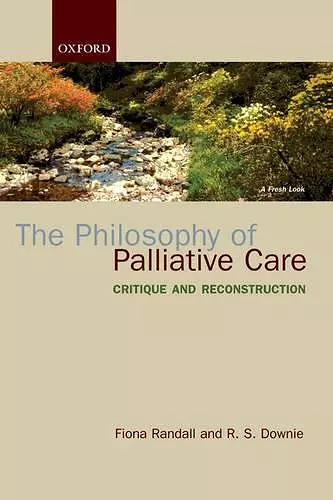The Philosophy of Palliative Care
Critique and reconstruction
R S Downie author Fiona Randall author
Format:Paperback
Publisher:Oxford University Press
Published:23rd Feb '06
Currently unavailable, and unfortunately no date known when it will be back

The idea of a philosophy of palliative care emerged with Cicely Saunders' vision for 'a good death', and was developed further with the WHO definition of palliative care. It is now being applied not only to cancer patients, but to all patients in end of life situations. As this 'palliative care approach' advances, it is important to pause and comment on its effectiveness. It is a philosophy of patient care, and is therefore open to critique and evaluation. Using the Oxford Textbook of Palliative Medicine, 3rd edition as their basic reference, Randall and Downie present their argument that the palliative care approach has become too busy and over-professionalised, and that it therefore has significant weaknesses. They examine the framework of the specialty - quality of life, autonomy, dignity, patient-centredness, and the priority assigned to relatives in the remit of care - and the moral problems associated with implementing such a philosophy. The resource implications of various health care policies are also discussed in relation to the WHO definition. Whilst the authors defend the achievements of palliative care and those who work in the profession, they present suggestions for an alternative philosophy. Their philosophy prompts many ethical and philosophical questions about the future of palliative care.
I think it is timely that we re-examine what it is that we do, which is what this interesting and thought-provoking book does. * Roger Woodruff, Director of Palliative Care, Austin Health, Melbourne, Australia *
...the work is honest and realistic. The authors define, acknowledge and justify the limits of what is possible and desirable in the relationship between doctors, other care workers, patients and families in palliative care. I believe it is a product of their intellectual rigour combined with deep and long immersion in the practical realities of the field...[and is] the most important achievement of their work; it is enlightening, shows proper humility and lays waste to the lofty arrogance of the various definitions,'philosophies' and 'position statements' that are generated by some large and powerful institutions. This book has my wholehearted recommendation. * S.C. Allen, The Royal Bournemouth Hospital *
Within a slim and readable 226 pages, they expose a significant number of basic inconsistencies and contradictions that they find in the currently accepted 'norms' or the speciality. But rather than leave it at that somewhat negative position, they also defend the achievements of the speciality and proceed to record the positive parts of the current situation. Finally, they present their case for a new philosophical statement to underpin the speciality as it adapts to work in the medical system of the 21st century...an excellent and easily accessible text which I suspect will be referred to a great deal in debates and discussions about the future of Palliative Care. * Oncology News, Vol. 1, Issue 2 *
It was/is often stated in book reviews that "this book should on every 's bookshelf". Well, I believe that this book should be in every hospice library bookshelf. It is asking important questions to every palliative care physician and clinician of whatever profession. As a result of reading this book they will be better informed and regard palliative care in a better way. Although the book is a critique it does highlight (at least to me) why palliative care is an essential component of any healthcare set up. * BMA Medical Book Competition 2007 *
- Winner of Winner, Medical Journalists Association Award 2007, Specialist Category.
ISBN: 9780198567363
Dimensions: 233mm x 157mm x 16mm
Weight: 394g
256 pages